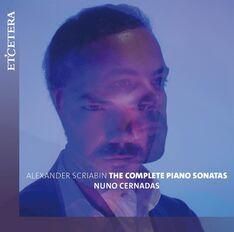Scriabins Klavierwerk ist eine Mischung aus Phantasie, Ekstatik, Schizophrenie und Phantasmen jeder Art. Der 1988 in Porto geborene Pianist Nuno Cernadas weiß mit Scriabin umzugehen, er weiß, was sein Spiel an Disziplin und Sensibilität braucht, damit sich die Musik richtig ausbreiten, damit der schweifende Atem dieses Mystikers zur Geltung kommen kann.
Cernadas kann delikat und sinnlich sein, überzeugt auch mit origineller Artikulation sowie einer ausgeprägten Vorliebe für Rubato und dynamische Variationen. Seine kühne Vorstellungskraft lässt den Zuhörer sich nie langweilen. seine Interpretationen bleiben rhythmisch variabel und lebendig, weil sie die werkimmanenten Spannungskurven genauso respektieren wie die Stimmungsangaben des Komponisten in den ja so verschiedenen Sonaten.
Die Neuaufnahme ist fesselnd von der ersten Note der Ersten Sonate bis zur letzten der zehnten Sonate mit ihrem bläulich und geheimnisvoll flimmernden Musiknebel und ihren ekstatische Erregungen, die – wie in anderen Sonaten – nie pure Kraftentfaltung sind, sondern einem inneren Beben gleichkommen.
So kann der Hörer die Musik voll auskosten. Am besten macht er für das Licht aus und setzt sich ins Dunkle. Die Reise in den weiten Scriabin-Kosmos wird dann ein Musikerlebnis, wie es einem nicht oft zuteilwird.
Scriabin’s piano works are a mixture of imagination, ecstasy, schizophrenia and fantasies of all kinds. The pianist Nuno Cernadas, born in Porto in 1988, knows how to deal with Scriabin, he knows what discipline and sensibility his playing needs so that the music can unfold properly, so that the wandering breath of this mystic can be expressed.
Cernadas can be delicate and sensual, but he also convinces with original articulation and a pronounced penchant for rubato and dynamic variations. His bold imagination never bores the listener. His interpretations remain rhythmically variable and lively because they respect the tension curves inherent in the music as well as the composer’s mood indications in the sonatas, which are so different.
This new recording captivates the listener from the first note of the First Sonata to the last of the Tenth, with its bluish, mysteriously shimmering musical mist and its ecstatic excitement, which – as in other sonatas – is never a pure display of power, but rather an inner trembling.
This allows the listener to fully enjoy the music. It is best to turn off the light and sit in the dark. The journey into Scriabin’s vast cosmos then becomes a musical experience not often granted.




















